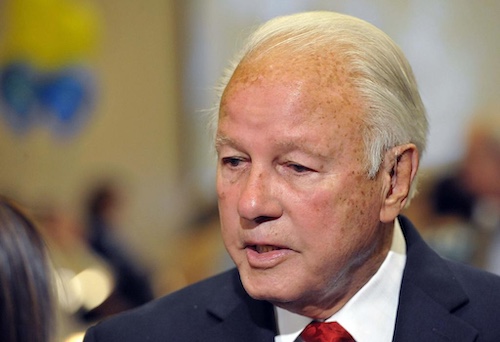Jim Beam column:Pet projects have long lives
Published 6:21 am Wednesday, June 12, 2024

- The late-Gov. Edwin W. Edwards of Louisiana launched what have become legislators' pet projects with a $10 million urban grant om 1984.(Photo courtesy of The Advocate).
Pet projects that had their origin in 1984 when the late-Gov. Edwin W. Edwards was governor have survived over most of the years since then. Legislators at their recent session managed to find $92.7 million for local pet projects at a time when they keep talking about a fiscal cliff coming next year.
Edwards was trying to get a tax package approved in 1984 and he urged legislators “to get on his train,” which I called the Cajun Express.
“You can’t get run over if you’re on the train,” Edwards said.
Trending
One opposition legislator said, “Heck, you don’t have any choice but to get on that train. That thing’s going so fast, if you’re anywhere near the track, you’re going to get sucked along in the wake.”
In order to get support from Black legislators, Edwards promised them $10 million for projects in their urban areas. When rural legislators got wind of the deal they wanted in on the action. That is when the Urban and Rural Development Funds were born.
Media and other critics called them “slush funds.” Legislators hated that nickname, claiming the money went to worthwhile projects. Some of it did but there was little accountability about how the money was being spent.
The late-Gov. Kathleen Blanco issued an executive order in 2006 requiring justification for all line items in the state budget. Her commissioner of administration said legislators would be asked to make it state law.
By that time, the slush funds had become pet projects. Two years later they were called funds for non-government organizations (NGOs). Taxpayers didn’t understand why some churches, community development agencies, gun clubs, fairs and festivals qualified for state money.
Applications had to be filed for that money in 2008 and NGOs had to tell the House Appropriations Committee a number of details about who they were and what they planned to do with the money. Even so, there was no way to determine whether the programs they sponsored were successful.
Trending
Some of the organizations were tutoring students after school. But in other cases, it was just a way for legislators to give jobs to friends and supporters.
Most of those early pet projects totaled about $30 million. The $92.7 million this year is one of the highest totals.
The Louisiana Illuminator in a June 5 report on the state budget said that money would benefit local government services and nonprofits in their home districts that typically would not receive state funding. It said in the past those nonprofits have included golf courses, etiquette organizations, Catholic churches and local Knights of Columbus chapters.
“They allocated the money (this year) despite the fact that the state may have to claw back $103.5 million in pet project spending from previous years because the organizations receiving the money didn’t say how they spent it,” the Illuminator said.
An additional $165 million for pet projects from previous years sits in state bank accounts because organizations and local governments haven’t submitted the initial paperwork that allows the state to release it.
Finding those pet projects is sometimes difficult. This year they got into House Bill 782 with amendments added in the House and Senate. There is rarely any debate or discussion about the annual funding for pet projects and the bill passed unanimously.
The project list begins on Page 28 of HB 782 under the heading, “State Aid to Local Government Entities.” There are about 16 projects per page over 38 pages, or a total of roughly 600 projects.
Some are local government grants, but there are many others. Some examples are $10,000 to St. Anthony Church in the town of Jean Lafitte for the church fair, $10,000 to Archbishop Shaw High School for the Seafood Festival, $10,000 for the Visitation of Our Lady Church for the church fair, and $250,000 to the YWCA of Greater Baton Rouge for building improvements and programs.
Louisiana House Speaker Phillip DeVillier, R-Eunice, said with a half-billion-dollar budget shortfall coming next year when a 0.45% state sales tax increase goes off the books these projects may be scrapped.
Unfortunately, these projects sponsored by legislators that help them get re-elected have managed to survive for over 40 years and they aren’t likely to go away anytime soon.
Jim Beam, the retired editor of the American Press, has covered people and politics for more than six decades. Contact him at 337-515-8871 or jim.beam.press@gmail.com.
| ReplyForward
Add reaction |




